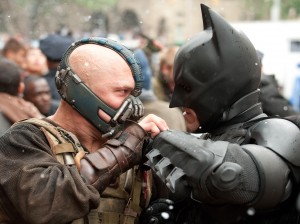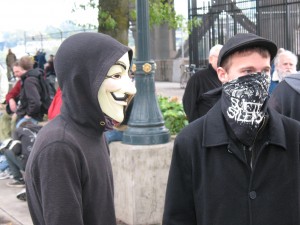 Here, everyone. Have another post about Batman!
Here, everyone. Have another post about Batman!
Major spoilers ahead. If you haven’t seen the movie yet, go away, see it, and then feel free to shove this post into your eyeballs.
This isn’t a review. I greatly enjoyed The Dark Knight Rises, though thought it had some pacing problems. Despite being almost three hours long, it felt a little rushed in some places, and there were a few plot holes that just had to be waved away by saying “because Batman.” It wasn’t as good as either The Dark Knight or Batman Begins, but still excellent. If nothing else, I loved how amazingly gigantic Nolan made the final chapter of the trilogy.
The Dark Knight Rises is a hugely ambitious movie that definitely wants to be about something. The film acknowledges the existence of poverty again and again with scenes of an orphanage and Selina Kyle’s impoverished friend. We’re also reminded of the decadent corruption of the corporate class when we see Bane initially working with Gotham’s business elite. The Dent Act, the thing that put thousands of criminals behind bars, is based on false pretenses. At the outset of the film, the social order is not ideal. It is ripe for upending. However, the shape that that revolution or reform takes is of vital importance. Bane, storming into Gotham, offers a new way. Over the course of of the movie, the various characters cavort and bellow in front of the camera, and I couldn’t help but think of which real-life political figures the characters were most like. For instance:
Bane is Kim Jong Il
Bane is a tyrant with a horde of dedicated followers who clearly adhere to a kind of cult of personality. He values martial strength as a virtue in and of itself, and the society that he leads, occupied Gotham, is bereft of any kind of infrastructure, culture, or way of being not directly related to its own militant self-perpetuation. Like almost all totalitarian regimes, Bane takes power in the name of “the people,” exploits popular discontent with the existing system, and gives his militaristic rule only the barest patina of rule of law (One of my favorite parts of the film was the Scarecrow playing the part of Robspierre).
The fear of nuclear annihilation is the trump card that keeps the rest of the world from streaming into Bane Jong-Il’s impoverished hermit kingdom. The bridges of Gotham echo the perpetual standoff of the Korean DMZ, and past an arbitrary line known as a “border” Bane can preside over decay as he pleases, parading his dystopia in the face of the world.
Catwoman is George Orwell (kinda)
I will admit this is something of a stretch, but bear with me for a moment. Orwell was a socialist who hated communism. He longed for change, equity, and greater fairness in the political and economic systems of his time, but when he saw Communism distort the ideals of him and his fellow leftists, he denounced it as tyranny. Selina Kyle is not happy with the inequality or unfairness of Gotham, and says as much to Bruce Wayne. (By the way, I absolutely loved Anne Hathaway as Kyle- she nailed it. That being said, I did think her “storm is coming” speech was a tad too heavy-handed.) However, she rejects the false populism of Bane, knowing that even though an unfair social order has been upended, it did not happen in the right way. Catwoman blowing away Bane with the guns on the Bat Pod was as potent a denunciation as Orwell gave to Stalinism in 1984.
Batman is George Washington and/or Nelson Mandela
Nolan ends the series with Bruce Wayne faking his own death, hanging up the cape and cowl, and disappearing. He willingly gives up power, prestige, and position that others would clamber and fight over, and bequeaths the identity Batman to another at the end of the film. Both George Washington and Mandela did a great service to their respective countries by willingly giving up power. Both of them could have held on to the title “president” for the rest of their days, but neither of them had an interest in their person being synonymous with the ideals of their country. Batman also does not want his legacy to be entangled in the person of Bruce Wayne- he wants it to be universal. This puts him far away from the Kim Jong Ils, Fidel Castros, Moammar Qaddafis and Mao Zedongs of the world. He’s more in keeping with Washington or Mandela who declined to make a position explicitly personal, and therefore potentially more tyrannical.
All that being said, I don’t think that The Dark Knight Rises had a singular political thrust to it. It wasn’t Animal Farm. Instead, it used various political fears and attitudes as backdrop and coloration for the story it wanted to tell. That is not necessarily a bad thing. Nolan’s trilogy very much is of its time, and very freely uses characters and people as broad representations for things that he knows are sources of anxiety for the audience.
(Case in point- the Gotham City PD. If the Nolan movies were actually “realistic,” as people seem to be fond of calling them, several of the cops would have probably joined Bane’s thugs. When freed, they probably wouldn’t have strode bravely into battle- instead, they probably would have wandered about filthy, broken and malnourished. However, I didn’t see them as representing literal cops. The big, final street battle was all about the rule of law finally confronting tyranny. Nolan’s movies are as sleek, stylized and unrealistic as anything from comics- that style is simply better at passing itself off as realism.)
I wonder how much of Nolan’s trilogy will look dated in ten or twenty years. Or, I wonder how much of it will be seen as a kind of time capsule for our era. Either way, the trilogy is mainly about the politics, crime, fears, terrors, and social welfare of a place called Gotham City. It does not necessarily work as a human drama or as a series wherein superheroes are put into a “realistic” environment. What makes it work, though, is that it makes visible very real, often unformed fears of terrorism and tyranny. The trilogy gives its hugeness the room it deserves, allowing its characters to be broad avatars who parade loudly before us as inspiring or terrifying symbols, the most prominent of all being Batman himself.

